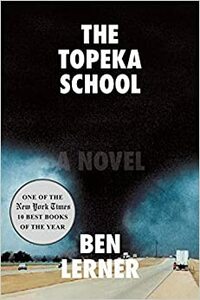Take a photo of a barcode or cover
emotional
reflective
slow-paced
Plot or Character Driven:
Character
Strong character development:
Yes
Loveable characters:
No
Diverse cast of characters:
No
Flaws of characters a main focus:
Yes
reflective
Plot or Character Driven:
Character
Flaws of characters a main focus:
Yes
Ben learners excellent writing really carried this book. Sometimes I had no idea what I was reading honestly but I knew it was Written beautifully. I liked how he used the same phrases in different parts of the book
Charges against this book for being pretentiously written with a thin plot, unlikable characters, and indulgent language are appropriate...but also I really liked it! This was my first time reading anything by Lerner, so based on the description, I went in expecting a much more straightforward book at home among YA fiction, and I'm honestly really glad that it was essentially the opposite of that. In fact, I think my favorite part of this book might be some of the elements others might roll their eyes at; I really liked the repeated phrases echoing throughout, the overt parallels, and way memory constantly erupts to displace or reshape the reality of the present moment. In my reading, it enriched the experience and created a sort of eerie fun-house effect where I was constantly bumping into unexpected presences and glimpsing strangely familiar reflections out of the corner of my eye. It's fitting that Lerner is a poet, as that ongoing wordplay and the use of recurring motifs and phrases immediately brought to mind numerous poetry collections that do the same.
I think my main agreement with criticism of the book is towards its characters, who were a bit underdeveloped and unlikable. It's structured to rotate chapters among Adam, his father Jonathan, and his mother Jane, with interludes from Darren in between each. These are often stream-of-conscious reflections, sometimes framed as monologue conversations but more often as rememberings. The writing indulges in conversational run-on sentences, embraces a frenetic and chaotic pace and tone at times, allows itself some level of obscurity and lingering confusion...and I think that all makes it more interesting to read, but gets in the way of knowing the characters, let alone following their development. This was most problematic with Adam, who is compellingly written as an authentic teenage pest in his teen years which unfortunately renders the final chapters a little hollow without our ability to see how he reached that point. I did find it somewhat sinister, how his character showcased the precarity of parenting; here is this young man raised by an esteemed feminist therapist and another therapist known as a sort of "lost boy"-whisperer, and yet he falls into the same trappings of toxic masculinity and moves through the world in ways that reflect that influence far more than theirs.
Of course, that is the theme of the book, and the book is ultimately most invested in exploring the ideas of its theme. I think this is done with an astute thoughtfulness, particularly in its awareness of all the ways that toxic masculinity goes unchecked and unchallenged because it's never taken seriously until its too late, and, more subtly, the ways it functions to not just harm women but to erase them. With that in mind, I don't know if it was intentional or not that the two women of the novel, Jane and Sima, were the most complicated and richly drawn characters with the most developed relationship. Jane's chapters were the clear highlight to me, showcasing a depth of tension and insight that seemed to notably exceed the others. But really, on the whole, I had a blast reading this and thinking about it in between readings; I'm curious to check out another of Lerner's books eventually.
I think my main agreement with criticism of the book is towards its characters, who were a bit underdeveloped and unlikable. It's structured to rotate chapters among Adam, his father Jonathan, and his mother Jane, with interludes from Darren in between each. These are often stream-of-conscious reflections, sometimes framed as monologue conversations but more often as rememberings. The writing indulges in conversational run-on sentences, embraces a frenetic and chaotic pace and tone at times, allows itself some level of obscurity and lingering confusion...and I think that all makes it more interesting to read, but gets in the way of knowing the characters, let alone following their development. This was most problematic with Adam, who is compellingly written as an authentic teenage pest in his teen years which unfortunately renders the final chapters a little hollow without our ability to see how he reached that point. I did find it somewhat sinister, how his character showcased the precarity of parenting; here is this young man raised by an esteemed feminist therapist and another therapist known as a sort of "lost boy"-whisperer, and yet he falls into the same trappings of toxic masculinity and moves through the world in ways that reflect that influence far more than theirs.
Of course, that is the theme of the book, and the book is ultimately most invested in exploring the ideas of its theme. I think this is done with an astute thoughtfulness, particularly in its awareness of all the ways that toxic masculinity goes unchecked and unchallenged because it's never taken seriously until its too late, and, more subtly, the ways it functions to not just harm women but to erase them. With that in mind, I don't know if it was intentional or not that the two women of the novel, Jane and Sima, were the most complicated and richly drawn characters with the most developed relationship. Jane's chapters were the clear highlight to me, showcasing a depth of tension and insight that seemed to notably exceed the others. But really, on the whole, I had a blast reading this and thinking about it in between readings; I'm curious to check out another of Lerner's books eventually.
Ugh! Why do I keep doing this to myself? I read and I'm not really enjoying a book but then something tells me to keep reading. For the life of me, I can't remember what told me to keep reading because, what a dud. The stream of consciousness storytelling was not my cup of tea. The ending was so abrupt.
challenging
reflective
slow-paced
Plot or Character Driven:
Character
Strong character development:
Yes
Loveable characters:
Complicated
Diverse cast of characters:
No
Flaws of characters a main focus:
Complicated
challenging
emotional
reflective
slow-paced
Plot or Character Driven:
Character
Strong character development:
Yes
Loveable characters:
Complicated
Diverse cast of characters:
No
Flaws of characters a main focus:
Yes
challenging
reflective
medium-paced
Plot or Character Driven:
Character
Strong character development:
Yes
Loveable characters:
Complicated
Diverse cast of characters:
No
Flaws of characters a main focus:
Yes
makes me anxious how nice certain sentences were
A book that’s wholly fine. I felt like much of what I read here was thematically interesting and the characters themselves were great but for some reason I did not click with it like I wanted to.
I don’t know what to say. It’s either a 2.5/5 or a 4.5/5.
The book works very hard in places, strains readability, gets lost in its non-sequiturs. It clearly wants to be something profound about how the world we know today came into being. And yet it also often carries its neo-liberalism quite awkwardly. Wanting you to believe that it has some tranformational insight just around the corner.
And yet, for much of the book, it’s characters, it’s narrative prose is crisp, piquing curiosity. I wanted to see where it was all going, though never truly satisfied about how it made the trip.
The book works very hard in places, strains readability, gets lost in its non-sequiturs. It clearly wants to be something profound about how the world we know today came into being. And yet it also often carries its neo-liberalism quite awkwardly. Wanting you to believe that it has some tranformational insight just around the corner.
And yet, for much of the book, it’s characters, it’s narrative prose is crisp, piquing curiosity. I wanted to see where it was all going, though never truly satisfied about how it made the trip.
With The Topeka School Ben Lerner has doubtlessly delivered a masterpiece and a genuine new addition to the novel as a art form. As engaging as it is intellectually demanding, the novel would surely benefit from a second reading.
Strucutred by the story of a violent party, Lerner actually tells the story of a specific form of American masculinity and Midwestern upbringing. As his prisma he chooses language, the collapse of it and the spread of a specific kind of conservative language. The story is told by four narrators who, however, switch registers and talk directly to the author in some chapters. This in turn significantly changes their voice. The parents earnest liberal ambitions and psychological training clash with what Adams learns from his peers and especially by the techniques he learns in debate club. This prompts Lerner to convincingly connect the aggressive language with the current political climate.
Touching upon everything that is fascinating about this novel is nearly impossible. I couldn't recommend it more warmly, this is surely one of the most important books of the year!
Strucutred by the story of a violent party, Lerner actually tells the story of a specific form of American masculinity and Midwestern upbringing. As his prisma he chooses language, the collapse of it and the spread of a specific kind of conservative language. The story is told by four narrators who, however, switch registers and talk directly to the author in some chapters. This in turn significantly changes their voice. The parents earnest liberal ambitions and psychological training clash with what Adams learns from his peers and especially by the techniques he learns in debate club. This prompts Lerner to convincingly connect the aggressive language with the current political climate.
Touching upon everything that is fascinating about this novel is nearly impossible. I couldn't recommend it more warmly, this is surely one of the most important books of the year!




